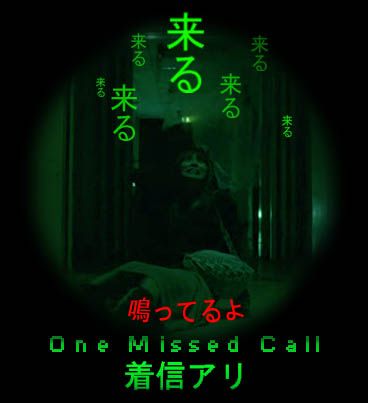

I really wanted to start this review with a fresh, hip and otherwise pleonastic introductory sentence that would grab your attention in the most extreme way possible. But that didn’t happen. Yep, I’m just going to have to take a ride on the cliche boat and say it: was this not a horror movie it would easily be in competition for title of my favorite film. No amount of acting or story can change the piece's genre and therefore it suffers from some inherent problems that simply cannot allow it to stand up to the likes of my favorite films. But enough about that for now, let’s start with a look at the movie shall we? Oh, I'm also proud to say this is spoiler free.
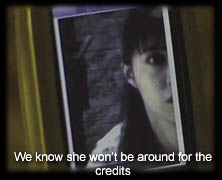 with the subtlety of a cinderblock to the face. There are few film buffs that agree on any sort of middle ground regarding the quality of Miike’s works. He’s either ‘unhealthily obsessed with nihilsm’ or ‘a genius deconstructionist’, take your pick. This is exactly why One Missed Call, (hereafter referred to by its original title Chakushin Ari),is a huge surprise. Forget for a moment that this is a horror movie and you will be shocked that this notch on Miike’s belt is a controlled and ‘realistic’ piece. This is his first major release in Japan that enjoyed heavy advertising and boasted a leading lady who was/is on everyone’s lips. Adapted from a novel by writer Yasushi Akimoto, Miike displays an amazing amount of self-control as he guides the viewer through not just a fantastic horror film but also an amazing story.
with the subtlety of a cinderblock to the face. There are few film buffs that agree on any sort of middle ground regarding the quality of Miike’s works. He’s either ‘unhealthily obsessed with nihilsm’ or ‘a genius deconstructionist’, take your pick. This is exactly why One Missed Call, (hereafter referred to by its original title Chakushin Ari),is a huge surprise. Forget for a moment that this is a horror movie and you will be shocked that this notch on Miike’s belt is a controlled and ‘realistic’ piece. This is his first major release in Japan that enjoyed heavy advertising and boasted a leading lady who was/is on everyone’s lips. Adapted from a novel by writer Yasushi Akimoto, Miike displays an amazing amount of self-control as he guides the viewer through not just a fantastic horror film but also an amazing story.
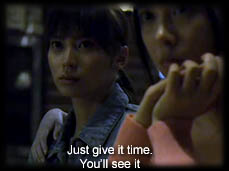 Actress Kou Shibasaki, one of the hottest young thesps in Japan as of this writing (2005), takes on her first leading role in a film with Chakushin Ari. Just for reference, you may not recognize the name but surely any Japanese film fan will remember, “That psycho girl from Battle Royale. Yes, Shibasaki Kou is indeed the scythe-wielding maniac Mitsuko from BR. Since then she’s refined her skills with roles in various films like Go and Drive, and in Chakushin Ari she emerges as reticent college Freshman Yumi Nakamura. Attending a singles’ party with her friends, Yumi heads to the bathroom to freshen up along with her classmate Yoko who had just come from a memorial service; recently a high school kouhai of her’s had died of asphyxiation during a scuba diving trip. No sooner does Yoko explain the cause of death than her cell phone begins to ring a chillingly eerie ring tone announcing a call. While Yoko is indisposed Yumi tells
Actress Kou Shibasaki, one of the hottest young thesps in Japan as of this writing (2005), takes on her first leading role in a film with Chakushin Ari. Just for reference, you may not recognize the name but surely any Japanese film fan will remember, “That psycho girl from Battle Royale. Yes, Shibasaki Kou is indeed the scythe-wielding maniac Mitsuko from BR. Since then she’s refined her skills with roles in various films like Go and Drive, and in Chakushin Ari she emerges as reticent college Freshman Yumi Nakamura. Attending a singles’ party with her friends, Yumi heads to the bathroom to freshen up along with her classmate Yoko who had just come from a memorial service; recently a high school kouhai of her’s had died of asphyxiation during a scuba diving trip. No sooner does Yoko explain the cause of death than her cell phone begins to ring a chillingly eerie ring tone announcing a call. While Yoko is indisposed Yumi tells 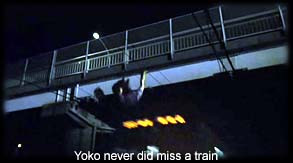 her that she is getting a call but a surprised Yoko states that the ring tone is not her’s. Upon checking the source of the call she finds the caller’s number is her own cell number dated two days in the future. Seeing a message left on her phone she checks: a train-crossing bell pings in the background and Yoko’s own voice can be heard, “Oh yuck, it’s started raining!”, followed moments later by a terrible scream. Nonchalantly brushing the occurrence off back at the table Yoko, Yumi and the others all exchange their cell phone numbers in order to prepare for a group vacation. Two days later while walking home from her part-time job Yoko gives Yumi a call to discuss shopping plans for the next day. Suddenly the connection begins to weaken and Yoko can barely hear Yumi, the panging train-crossing bell behind Yoko isn’t helping either. When a wet droplet of water falls on Yoko’s hand she looks to the sky and declares, “Oh yuck, it’s started raining!” Yumi hears the phrase and calls out to her friend but it’s too late, with a awful scream a force hurls Yoko through a metal grate and into the path of the on-coming train, tearing her body apart, yet somehow, her severed arm types away on her cell phone, dialing the next victim in what is soon to become a string of vicious murders.
her that she is getting a call but a surprised Yoko states that the ring tone is not her’s. Upon checking the source of the call she finds the caller’s number is her own cell number dated two days in the future. Seeing a message left on her phone she checks: a train-crossing bell pings in the background and Yoko’s own voice can be heard, “Oh yuck, it’s started raining!”, followed moments later by a terrible scream. Nonchalantly brushing the occurrence off back at the table Yoko, Yumi and the others all exchange their cell phone numbers in order to prepare for a group vacation. Two days later while walking home from her part-time job Yoko gives Yumi a call to discuss shopping plans for the next day. Suddenly the connection begins to weaken and Yoko can barely hear Yumi, the panging train-crossing bell behind Yoko isn’t helping either. When a wet droplet of water falls on Yoko’s hand she looks to the sky and declares, “Oh yuck, it’s started raining!” Yumi hears the phrase and calls out to her friend but it’s too late, with a awful scream a force hurls Yoko through a metal grate and into the path of the on-coming train, tearing her body apart, yet somehow, her severed arm types away on her cell phone, dialing the next victim in what is soon to become a string of vicious murders.
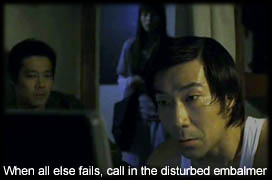
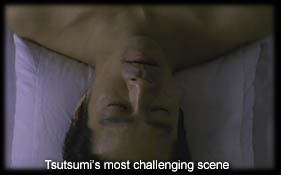 (Shinichi Tsutsumi who previously worked with Shibasaki in Drive) adds a few clues to unraveling the mystery which, believe it or not, actually starts to reveal itself with the rolling of the opening credits. This brings up another excellent point, Chakushin Ari is a film that demands multiple viewings. Normally horror films lend themselves to characters figuring out clues by dues ex machina. None of that here folks, writer Akimoto has done what I thought was impossible, planted every clue and every scenario with tender loving care. You can only pick up on some of them through several viewings but every time it dawns on you why the characters are doing what they’re doing or exactly why they have the connections they have, you’ll be sure to grin and say a silent ‘thank you’ to Miike and Akimoto. But then again, for you horror buffs, this isn’t what you’re looking for now is it?
(Shinichi Tsutsumi who previously worked with Shibasaki in Drive) adds a few clues to unraveling the mystery which, believe it or not, actually starts to reveal itself with the rolling of the opening credits. This brings up another excellent point, Chakushin Ari is a film that demands multiple viewings. Normally horror films lend themselves to characters figuring out clues by dues ex machina. None of that here folks, writer Akimoto has done what I thought was impossible, planted every clue and every scenario with tender loving care. You can only pick up on some of them through several viewings but every time it dawns on you why the characters are doing what they’re doing or exactly why they have the connections they have, you’ll be sure to grin and say a silent ‘thank you’ to Miike and Akimoto. But then again, for you horror buffs, this isn’t what you’re looking for now is it?
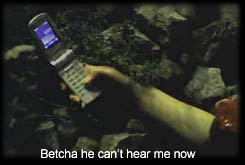 As far as the genre goes I’ve traditionally shirked away from horror because of its lack of brains behind the blood (no pun intended). However, since Ring I’ve been sucked into the modern Japanese horror film scene. In my humble opinion, after viewings of what Japan has to offer with the likes of Battle Royale, Juon Series, Ring Series, Uzumaki, Tomie, etc. I may not have enjoyed staring at the awful events on screen at times, but I’ve never been ‘scared’ to watch. As I sat in Minami Hikone’s Viva City Theater by myself on the day of Chakushin Ari’s public premier on January 17th 2004, I’m not ashamed to admit I watched most of the last 20 minutes of the film through my hands and squinted eyes. I won't play macho and you’re welcome to mail me about how “brave and l33t” you were if the film didn’t scare you. It freaked me out. If you’re a casual horror fan that can let yourself get caught up in the movie, the final major segment of the movie in an abandoned hospital is horror genius. Sure they employ a few tricks we’ve seen before but all except for one predictable scene with a mirror, they’re all pulled off when the audience least expects it, at times with a ferocity that left me begging for mercy.
As far as the genre goes I’ve traditionally shirked away from horror because of its lack of brains behind the blood (no pun intended). However, since Ring I’ve been sucked into the modern Japanese horror film scene. In my humble opinion, after viewings of what Japan has to offer with the likes of Battle Royale, Juon Series, Ring Series, Uzumaki, Tomie, etc. I may not have enjoyed staring at the awful events on screen at times, but I’ve never been ‘scared’ to watch. As I sat in Minami Hikone’s Viva City Theater by myself on the day of Chakushin Ari’s public premier on January 17th 2004, I’m not ashamed to admit I watched most of the last 20 minutes of the film through my hands and squinted eyes. I won't play macho and you’re welcome to mail me about how “brave and l33t” you were if the film didn’t scare you. It freaked me out. If you’re a casual horror fan that can let yourself get caught up in the movie, the final major segment of the movie in an abandoned hospital is horror genius. Sure they employ a few tricks we’ve seen before but all except for one predictable scene with a mirror, they’re all pulled off when the audience least expects it, at times with a ferocity that left me begging for mercy.
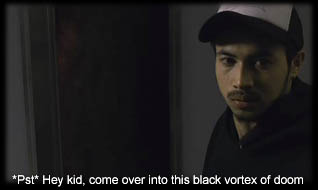 Overacting is the order of the day as Tsutsumi plays his role a little too strongly, seemingly prone to adult male temper tantrums which in one scene leaves him screaming at a mute orphan. The whole situation is supposed to be intense but verges on hilarious as a grown man clears his lungs on a tiny girl who obviously isn’t going to reply. Shibasaki on the other hand, does a superb job as Yumi. She never smiles and remains the strong but somewhat traumatized young woman we come to know her as throughout the film. Once again, thanks to the clever placement of events, there isn’t a moment where the audience feels the need to yell at her, “DON’T GO IN THERE!”, because every instance of horror stereotype is challenged by a reasonable setup. She has plenty of screaming but mercifully never betrays her character and calls for help. She takes on plenty of difficult tasks on her own and never lets slip any helpless damsel in distress moments. Pay close enough attention to the story and you’ll even see her challenge more than one skeleton in her closet by the end of the film.
Overacting is the order of the day as Tsutsumi plays his role a little too strongly, seemingly prone to adult male temper tantrums which in one scene leaves him screaming at a mute orphan. The whole situation is supposed to be intense but verges on hilarious as a grown man clears his lungs on a tiny girl who obviously isn’t going to reply. Shibasaki on the other hand, does a superb job as Yumi. She never smiles and remains the strong but somewhat traumatized young woman we come to know her as throughout the film. Once again, thanks to the clever placement of events, there isn’t a moment where the audience feels the need to yell at her, “DON’T GO IN THERE!”, because every instance of horror stereotype is challenged by a reasonable setup. She has plenty of screaming but mercifully never betrays her character and calls for help. She takes on plenty of difficult tasks on her own and never lets slip any helpless damsel in distress moments. Pay close enough attention to the story and you’ll even see her challenge more than one skeleton in her closet by the end of the film.
 Stick with the film even if you find yourself comparing it to Ring after the first 20 minutes. You’ll find many similarities between the two at first, especially with scenes like Yoko’s memorial service and high school students giving up the latest gossip; forgive those necessary vehicles of information for the viewer and you’ll be able to see the rest of the movie as the unique thriller it is. As I said earlier, you won’t find me spilling the beans here, but there’s a surprise waiting at the end of the film which takes what Ring had to offer and gives it a hearty beating.
Stick with the film even if you find yourself comparing it to Ring after the first 20 minutes. You’ll find many similarities between the two at first, especially with scenes like Yoko’s memorial service and high school students giving up the latest gossip; forgive those necessary vehicles of information for the viewer and you’ll be able to see the rest of the movie as the unique thriller it is. As I said earlier, you won’t find me spilling the beans here, but there’s a surprise waiting at the end of the film which takes what Ring had to offer and gives it a hearty beating.
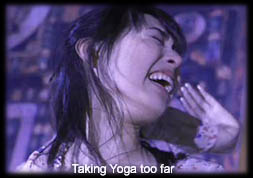 Last but not least, I dare not end this without some fanboyish praise of the film’s trademark, Death’s Ringtone. The moment I left the theater I was clicking away on the Docomo network searching for it but could only find the movie’s main theme Ikutsuka no Sora sung by Shibasaki herself with lyrics by the original novel’s author, Akimoto. Luckily, when I tried to get the ring tone again some time later, not only was I able to find the ring itself, but remixes of the tune! Once you see the flick with a few friends the possibilities for mischief with the melody are endless. Hint: Make the ringtone your alarm clock melody and set it to go off at 4AM. Simply leave the cell in your friend’s room overnight and prepare for a nasty call the next day.
Last but not least, I dare not end this without some fanboyish praise of the film’s trademark, Death’s Ringtone. The moment I left the theater I was clicking away on the Docomo network searching for it but could only find the movie’s main theme Ikutsuka no Sora sung by Shibasaki herself with lyrics by the original novel’s author, Akimoto. Luckily, when I tried to get the ring tone again some time later, not only was I able to find the ring itself, but remixes of the tune! Once you see the flick with a few friends the possibilities for mischief with the melody are endless. Hint: Make the ringtone your alarm clock melody and set it to go off at 4AM. Simply leave the cell in your friend’s room overnight and prepare for a nasty call the next day.